ATMC BUS102 Introduction to Economics Assignment - Semester 2
VerifiedAdded on 2022/10/18
|8
|990
|9
Homework Assignment
AI Summary
This economics assignment analyzes the impact of OPEC and oil market dynamics. It begins with an overview of how oil prices are determined by supply and demand and the role of speculation. The assignment answers questions about how deliberate output restrictions by OPEC cartels lead to oil price shocks and explains the concept of a cartel, using OPEC as an example. It further discusses stagflationary effects of oil supply restrictions, the impact of expansionary demand shocks on oil prices, and the effects of supply constraints on global demand. The assignment concludes by referencing the 2014 oil price collapse and its reversal. The student used the provided article and other sources to answer the questions and included references.
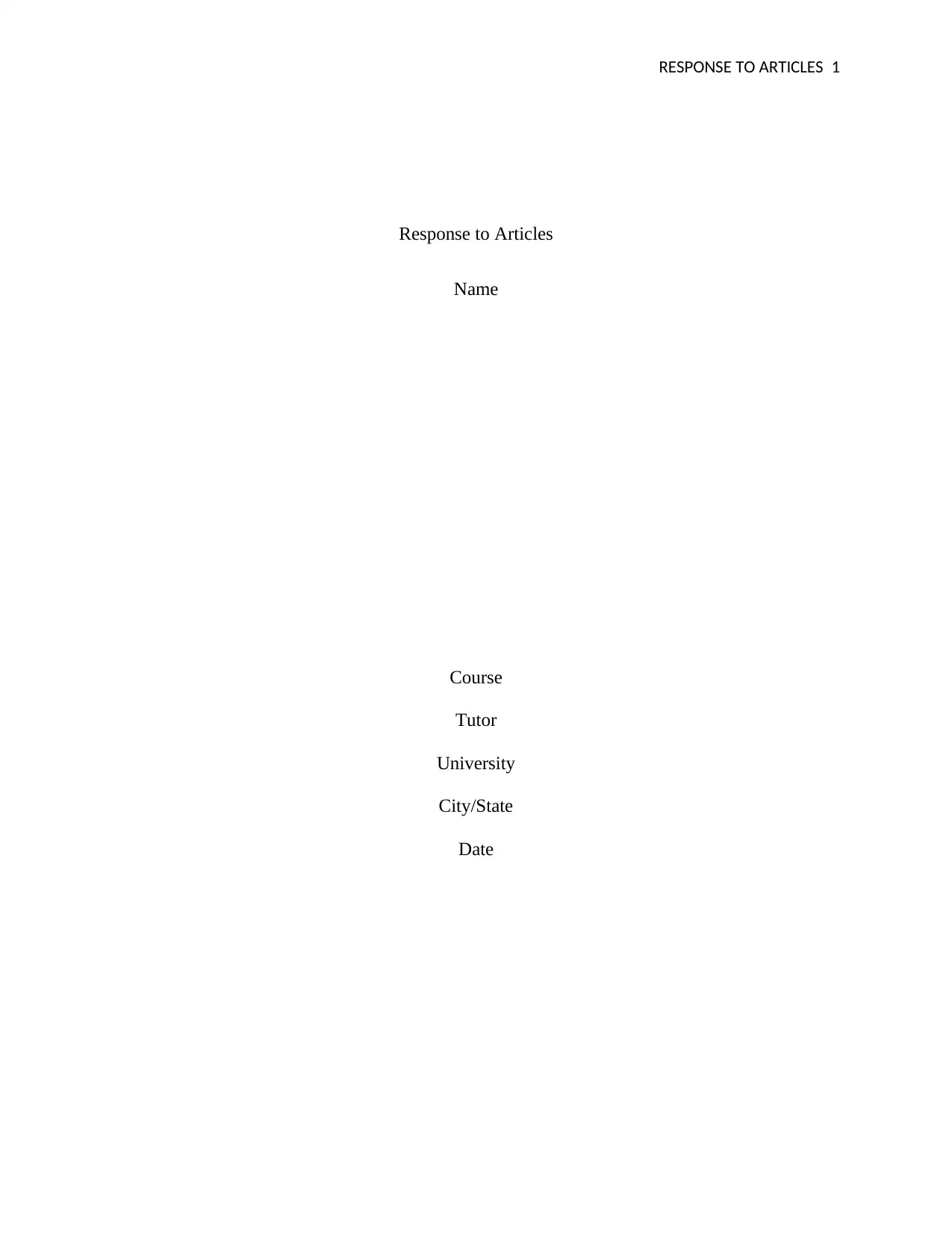
RESPONSE TO ARTICLES 1
Response to Articles
Name
Course
Tutor
University
City/State
Date
Response to Articles
Name
Course
Tutor
University
City/State
Date
Paraphrase This Document
Need a fresh take? Get an instant paraphrase of this document with our AI Paraphraser
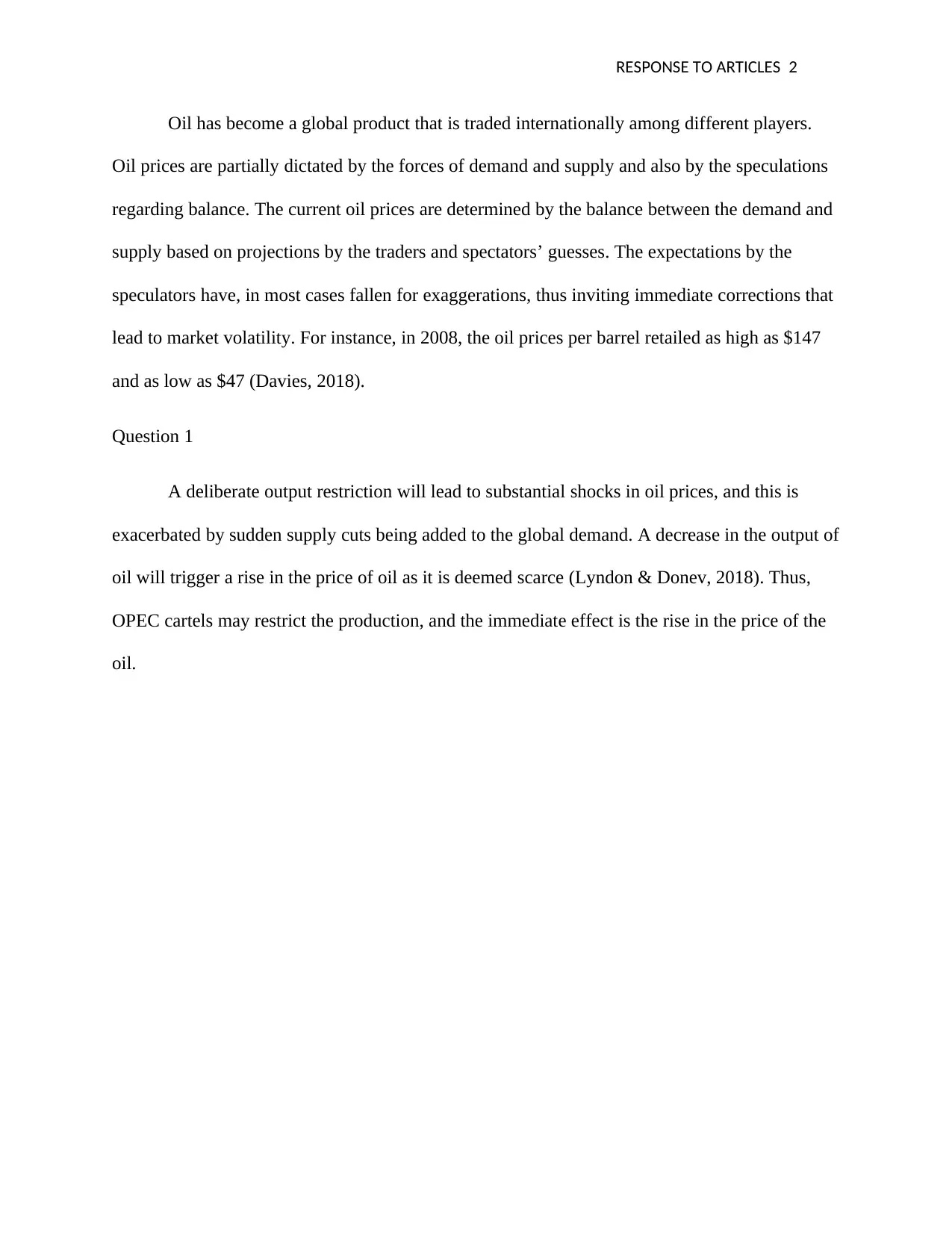
RESPONSE TO ARTICLES 2
Oil has become a global product that is traded internationally among different players.
Oil prices are partially dictated by the forces of demand and supply and also by the speculations
regarding balance. The current oil prices are determined by the balance between the demand and
supply based on projections by the traders and spectators’ guesses. The expectations by the
speculators have, in most cases fallen for exaggerations, thus inviting immediate corrections that
lead to market volatility. For instance, in 2008, the oil prices per barrel retailed as high as $147
and as low as $47 (Davies, 2018).
Question 1
A deliberate output restriction will lead to substantial shocks in oil prices, and this is
exacerbated by sudden supply cuts being added to the global demand. A decrease in the output of
oil will trigger a rise in the price of oil as it is deemed scarce (Lyndon & Donev, 2018). Thus,
OPEC cartels may restrict the production, and the immediate effect is the rise in the price of the
oil.
Oil has become a global product that is traded internationally among different players.
Oil prices are partially dictated by the forces of demand and supply and also by the speculations
regarding balance. The current oil prices are determined by the balance between the demand and
supply based on projections by the traders and spectators’ guesses. The expectations by the
speculators have, in most cases fallen for exaggerations, thus inviting immediate corrections that
lead to market volatility. For instance, in 2008, the oil prices per barrel retailed as high as $147
and as low as $47 (Davies, 2018).
Question 1
A deliberate output restriction will lead to substantial shocks in oil prices, and this is
exacerbated by sudden supply cuts being added to the global demand. A decrease in the output of
oil will trigger a rise in the price of oil as it is deemed scarce (Lyndon & Donev, 2018). Thus,
OPEC cartels may restrict the production, and the immediate effect is the rise in the price of the
oil.
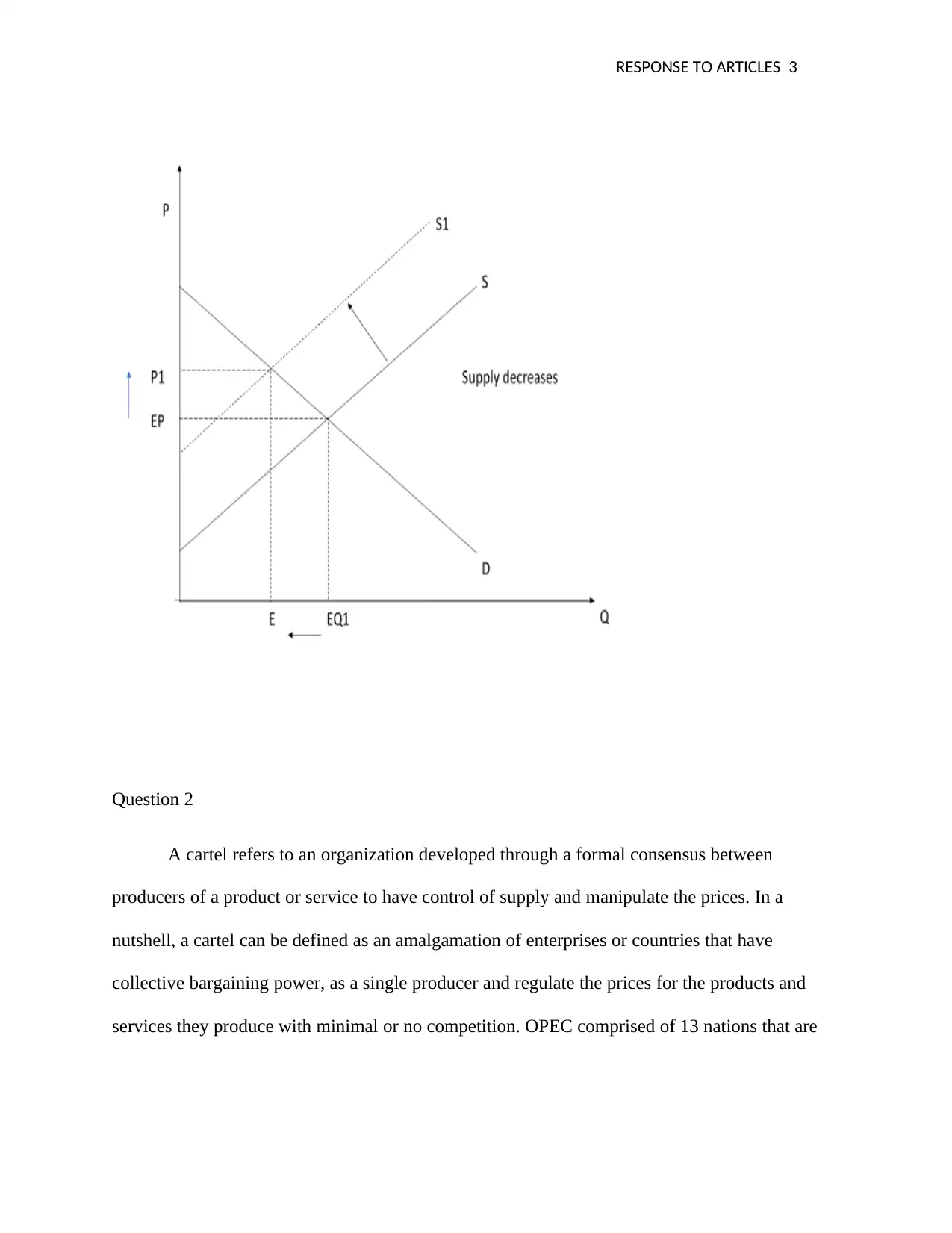
RESPONSE TO ARTICLES 3
Question 2
A cartel refers to an organization developed through a formal consensus between
producers of a product or service to have control of supply and manipulate the prices. In a
nutshell, a cartel can be defined as an amalgamation of enterprises or countries that have
collective bargaining power, as a single producer and regulate the prices for the products and
services they produce with minimal or no competition. OPEC comprised of 13 nations that are
Question 2
A cartel refers to an organization developed through a formal consensus between
producers of a product or service to have control of supply and manipulate the prices. In a
nutshell, a cartel can be defined as an amalgamation of enterprises or countries that have
collective bargaining power, as a single producer and regulate the prices for the products and
services they produce with minimal or no competition. OPEC comprised of 13 nations that are
⊘ This is a preview!⊘
Do you want full access?
Subscribe today to unlock all pages.

Trusted by 1+ million students worldwide
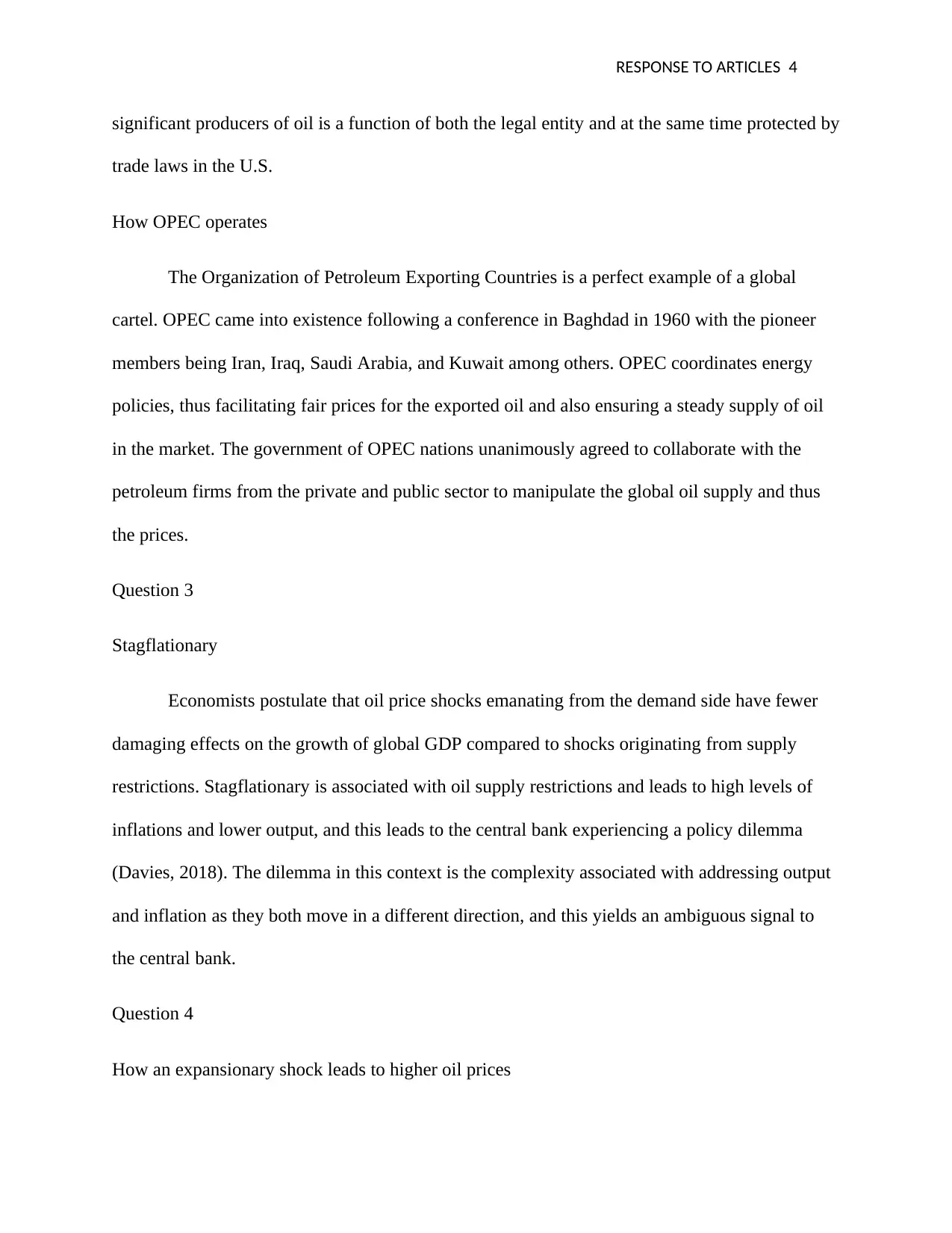
RESPONSE TO ARTICLES 4
significant producers of oil is a function of both the legal entity and at the same time protected by
trade laws in the U.S.
How OPEC operates
The Organization of Petroleum Exporting Countries is a perfect example of a global
cartel. OPEC came into existence following a conference in Baghdad in 1960 with the pioneer
members being Iran, Iraq, Saudi Arabia, and Kuwait among others. OPEC coordinates energy
policies, thus facilitating fair prices for the exported oil and also ensuring a steady supply of oil
in the market. The government of OPEC nations unanimously agreed to collaborate with the
petroleum firms from the private and public sector to manipulate the global oil supply and thus
the prices.
Question 3
Stagflationary
Economists postulate that oil price shocks emanating from the demand side have fewer
damaging effects on the growth of global GDP compared to shocks originating from supply
restrictions. Stagflationary is associated with oil supply restrictions and leads to high levels of
inflations and lower output, and this leads to the central bank experiencing a policy dilemma
(Davies, 2018). The dilemma in this context is the complexity associated with addressing output
and inflation as they both move in a different direction, and this yields an ambiguous signal to
the central bank.
Question 4
How an expansionary shock leads to higher oil prices
significant producers of oil is a function of both the legal entity and at the same time protected by
trade laws in the U.S.
How OPEC operates
The Organization of Petroleum Exporting Countries is a perfect example of a global
cartel. OPEC came into existence following a conference in Baghdad in 1960 with the pioneer
members being Iran, Iraq, Saudi Arabia, and Kuwait among others. OPEC coordinates energy
policies, thus facilitating fair prices for the exported oil and also ensuring a steady supply of oil
in the market. The government of OPEC nations unanimously agreed to collaborate with the
petroleum firms from the private and public sector to manipulate the global oil supply and thus
the prices.
Question 3
Stagflationary
Economists postulate that oil price shocks emanating from the demand side have fewer
damaging effects on the growth of global GDP compared to shocks originating from supply
restrictions. Stagflationary is associated with oil supply restrictions and leads to high levels of
inflations and lower output, and this leads to the central bank experiencing a policy dilemma
(Davies, 2018). The dilemma in this context is the complexity associated with addressing output
and inflation as they both move in a different direction, and this yields an ambiguous signal to
the central bank.
Question 4
How an expansionary shock leads to higher oil prices
Paraphrase This Document
Need a fresh take? Get an instant paraphrase of this document with our AI Paraphraser
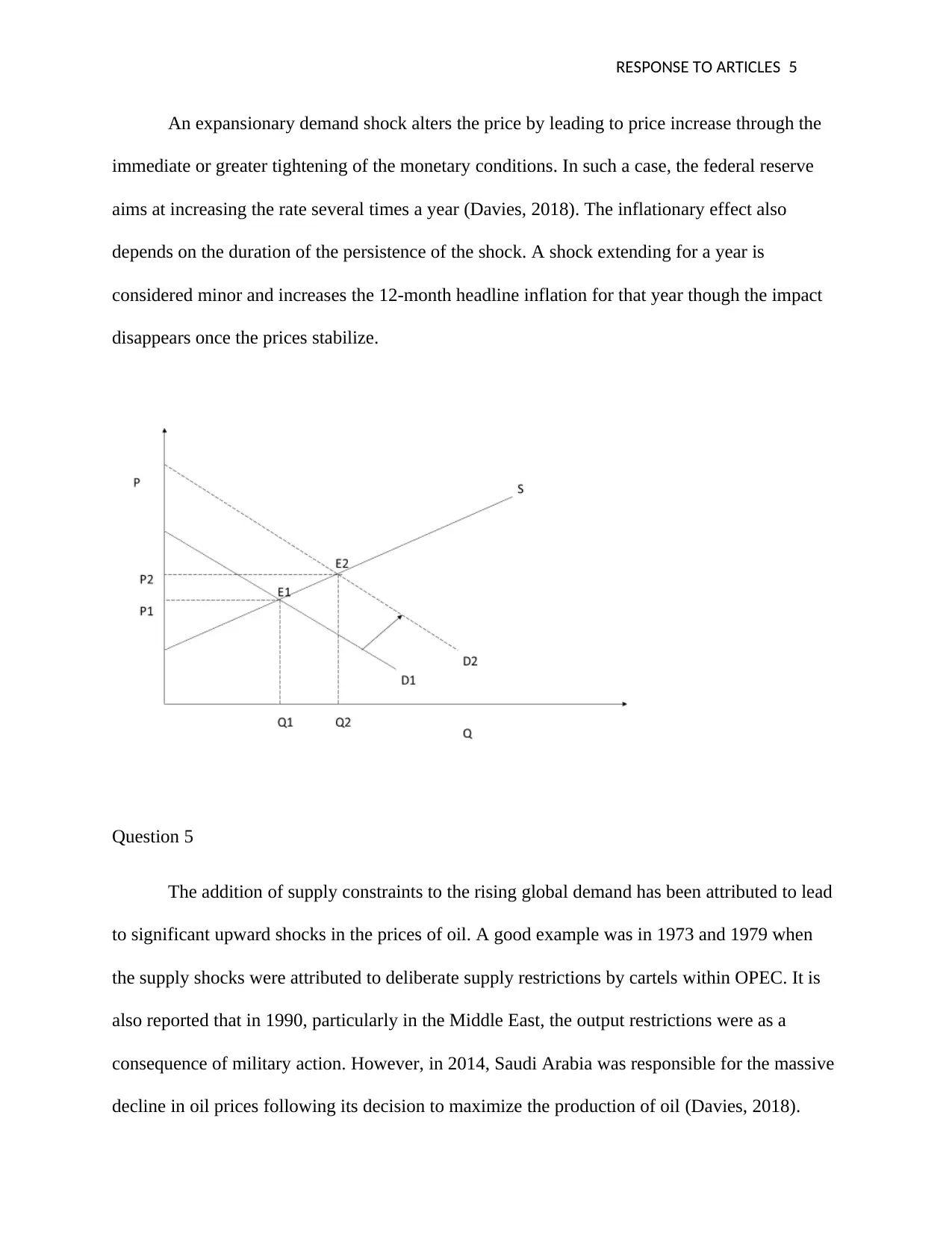
RESPONSE TO ARTICLES 5
An expansionary demand shock alters the price by leading to price increase through the
immediate or greater tightening of the monetary conditions. In such a case, the federal reserve
aims at increasing the rate several times a year (Davies, 2018). The inflationary effect also
depends on the duration of the persistence of the shock. A shock extending for a year is
considered minor and increases the 12-month headline inflation for that year though the impact
disappears once the prices stabilize.
Question 5
The addition of supply constraints to the rising global demand has been attributed to lead
to significant upward shocks in the prices of oil. A good example was in 1973 and 1979 when
the supply shocks were attributed to deliberate supply restrictions by cartels within OPEC. It is
also reported that in 1990, particularly in the Middle East, the output restrictions were as a
consequence of military action. However, in 2014, Saudi Arabia was responsible for the massive
decline in oil prices following its decision to maximize the production of oil (Davies, 2018).
An expansionary demand shock alters the price by leading to price increase through the
immediate or greater tightening of the monetary conditions. In such a case, the federal reserve
aims at increasing the rate several times a year (Davies, 2018). The inflationary effect also
depends on the duration of the persistence of the shock. A shock extending for a year is
considered minor and increases the 12-month headline inflation for that year though the impact
disappears once the prices stabilize.
Question 5
The addition of supply constraints to the rising global demand has been attributed to lead
to significant upward shocks in the prices of oil. A good example was in 1973 and 1979 when
the supply shocks were attributed to deliberate supply restrictions by cartels within OPEC. It is
also reported that in 1990, particularly in the Middle East, the output restrictions were as a
consequence of military action. However, in 2014, Saudi Arabia was responsible for the massive
decline in oil prices following its decision to maximize the production of oil (Davies, 2018).
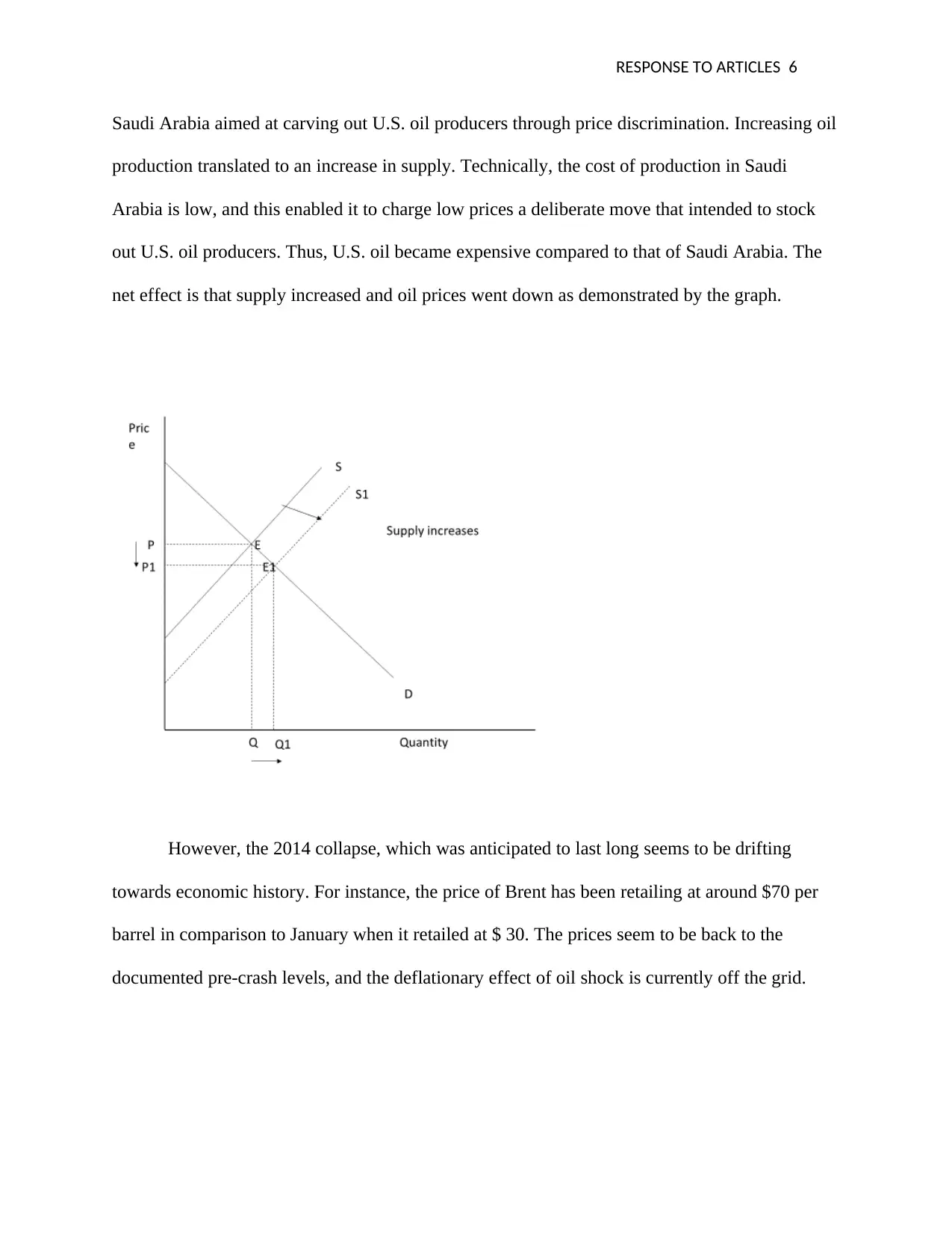
RESPONSE TO ARTICLES 6
Saudi Arabia aimed at carving out U.S. oil producers through price discrimination. Increasing oil
production translated to an increase in supply. Technically, the cost of production in Saudi
Arabia is low, and this enabled it to charge low prices a deliberate move that intended to stock
out U.S. oil producers. Thus, U.S. oil became expensive compared to that of Saudi Arabia. The
net effect is that supply increased and oil prices went down as demonstrated by the graph.
However, the 2014 collapse, which was anticipated to last long seems to be drifting
towards economic history. For instance, the price of Brent has been retailing at around $70 per
barrel in comparison to January when it retailed at $ 30. The prices seem to be back to the
documented pre-crash levels, and the deflationary effect of oil shock is currently off the grid.
Saudi Arabia aimed at carving out U.S. oil producers through price discrimination. Increasing oil
production translated to an increase in supply. Technically, the cost of production in Saudi
Arabia is low, and this enabled it to charge low prices a deliberate move that intended to stock
out U.S. oil producers. Thus, U.S. oil became expensive compared to that of Saudi Arabia. The
net effect is that supply increased and oil prices went down as demonstrated by the graph.
However, the 2014 collapse, which was anticipated to last long seems to be drifting
towards economic history. For instance, the price of Brent has been retailing at around $70 per
barrel in comparison to January when it retailed at $ 30. The prices seem to be back to the
documented pre-crash levels, and the deflationary effect of oil shock is currently off the grid.
⊘ This is a preview!⊘
Do you want full access?
Subscribe today to unlock all pages.

Trusted by 1+ million students worldwide
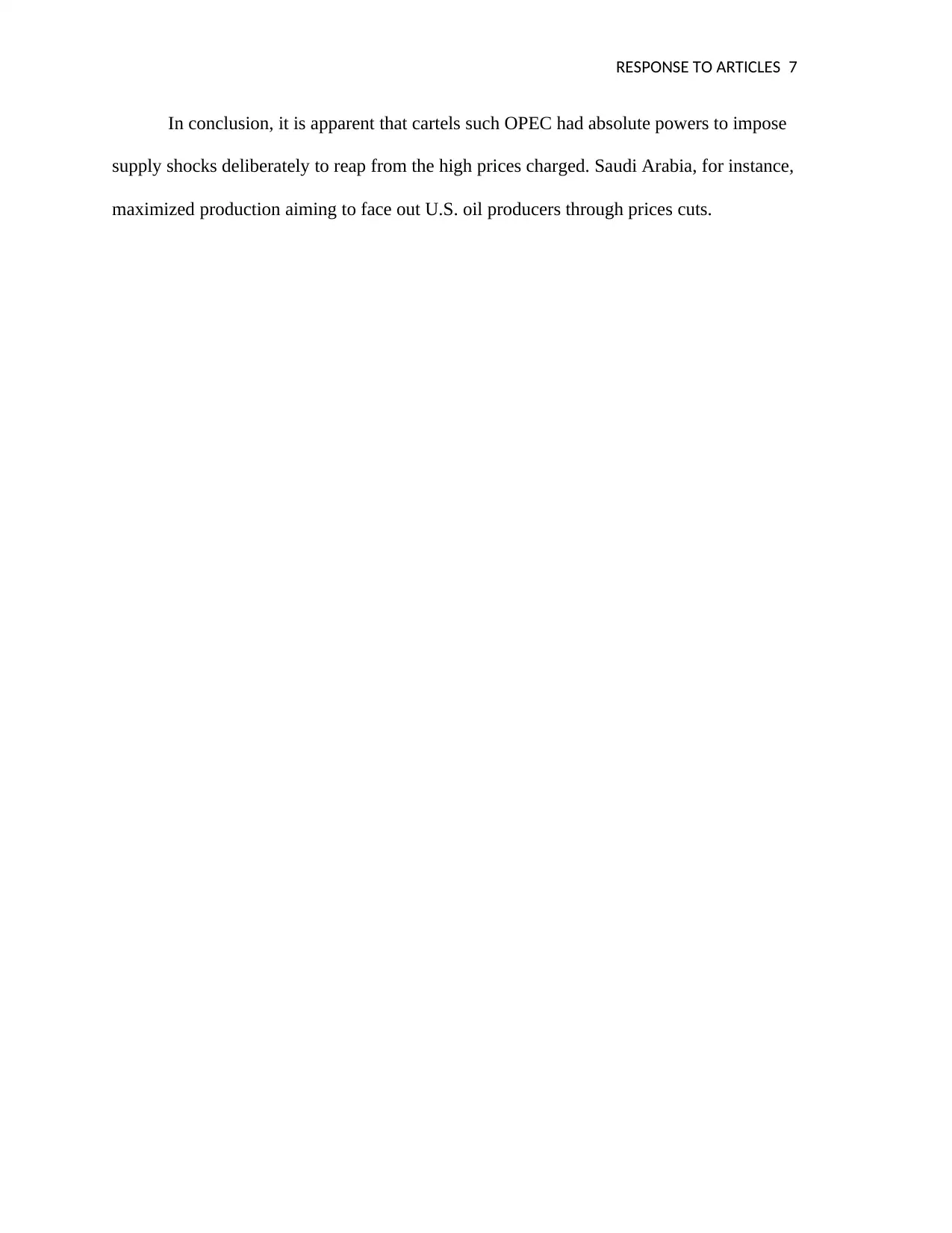
RESPONSE TO ARTICLES 7
In conclusion, it is apparent that cartels such OPEC had absolute powers to impose
supply shocks deliberately to reap from the high prices charged. Saudi Arabia, for instance,
maximized production aiming to face out U.S. oil producers through prices cuts.
In conclusion, it is apparent that cartels such OPEC had absolute powers to impose
supply shocks deliberately to reap from the high prices charged. Saudi Arabia, for instance,
maximized production aiming to face out U.S. oil producers through prices cuts.
Paraphrase This Document
Need a fresh take? Get an instant paraphrase of this document with our AI Paraphraser
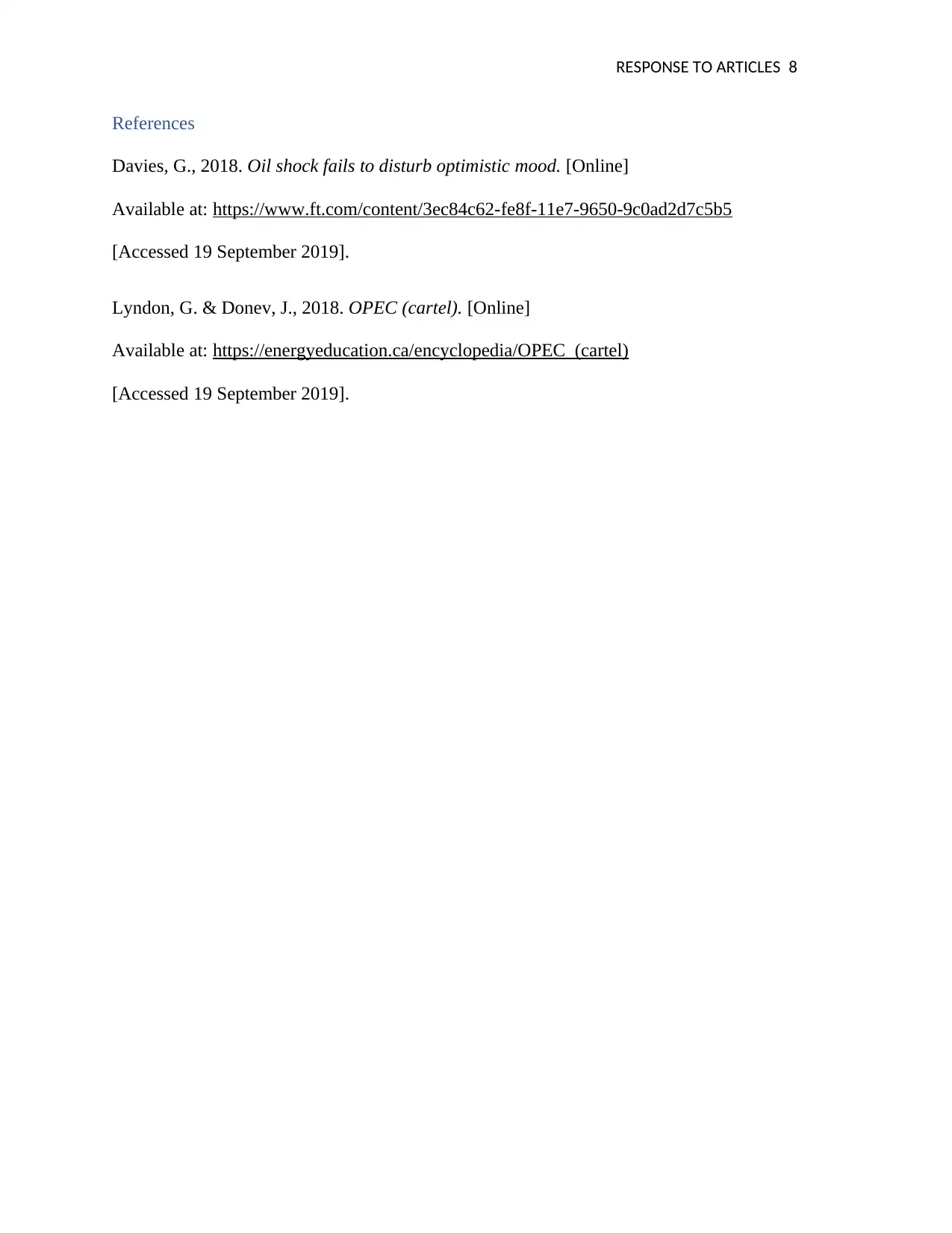
RESPONSE TO ARTICLES 8
References
Davies, G., 2018. Oil shock fails to disturb optimistic mood. [Online]
Available at: https://www.ft.com/content/3ec84c62-fe8f-11e7-9650-9c0ad2d7c5b5
[Accessed 19 September 2019].
Lyndon, G. & Donev, J., 2018. OPEC (cartel). [Online]
Available at: https://energyeducation.ca/encyclopedia/OPEC_(cartel)
[Accessed 19 September 2019].
References
Davies, G., 2018. Oil shock fails to disturb optimistic mood. [Online]
Available at: https://www.ft.com/content/3ec84c62-fe8f-11e7-9650-9c0ad2d7c5b5
[Accessed 19 September 2019].
Lyndon, G. & Donev, J., 2018. OPEC (cartel). [Online]
Available at: https://energyeducation.ca/encyclopedia/OPEC_(cartel)
[Accessed 19 September 2019].
1 out of 8
Related Documents
Your All-in-One AI-Powered Toolkit for Academic Success.
+13062052269
info@desklib.com
Available 24*7 on WhatsApp / Email
![[object Object]](/_next/static/media/star-bottom.7253800d.svg)
Unlock your academic potential
Copyright © 2020–2025 A2Z Services. All Rights Reserved. Developed and managed by ZUCOL.





